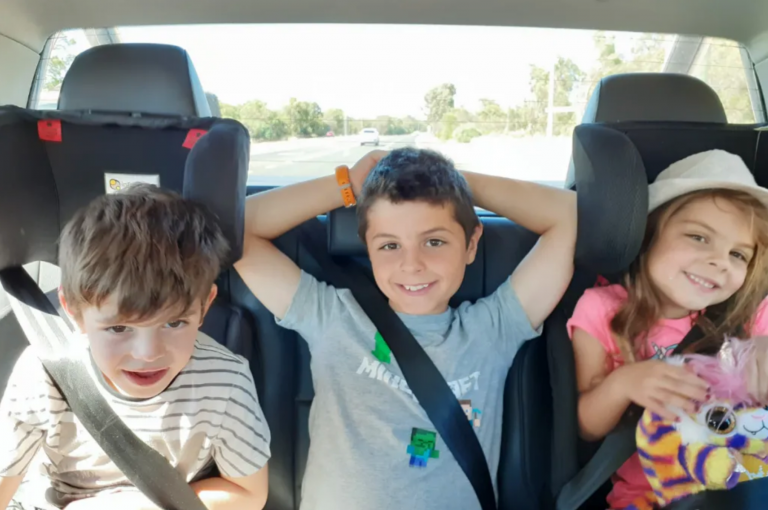The pandemic has created a workplace environment with a window into our homes, bridging the gap between our work and personal lives. But a new Circle In survey shows parents and caregivers need more from their employers than recognition of family and flexible work policy to juggle the demands of work and life. Author, father, and advocate Rob Sturrock implores us to seize this opportunity to overhaul the way we work and care.
I remember how hectic the juggle was before the pandemic. It involved a lot of rushing about, scampering to make the bus into the city, a lot of coordinating with my wife, Julia, about who was doing pick-up and dinner, and where we’d leave the car for the parent collecting the kids from child care. There was only the occasional work from home day, where I’d often join a scratchy teleconference and struggle to hear what others were saying.
The juggle has always been exhausting and precarious, but entering the third year of COVID-19, it has only gotten more intense. We’ve had to adapt to a scenario where home, office, school, and/or child care are fused. Our scope of existence has shrunk to four walls, often not even going to the supermarket to get the groceries for a change of scene. Parents’ personal space, which was already limited, became non-existent as kids climbed onto our laps during videoconference calls, wrote all over our notebooks, and demanded attention or playtime from Mum or Dad. We’re not getting that regular incidental interaction with colleagues in the office. Our minds feel foggy and our moods more irascible. Additionally, we can not plan a holiday to the coast or interstate, let alone abroad, with any real confidence or certainty.
Given the above, the results from the new Circle In survey of over 400 parents and caregivers come as less of a surprise and more of a confirmation of our collective experiences. Of those who responded to the survey, a total of 85% of caregivers feel at times that they are not coping. This high response rate is a clear indication of how hard things have been of late, especially in those regions where long lockdowns dominated life
The survey also reveals that caregivers need more than permission to work from home to feel accommodated. A total of 77% of caregivers who responded to the Circle In survey believe their employer could do more to support them. Additionally, 50% of caregivers responded that they do not feel a sense of belonging in their workplace. As employees feel adrift, they contemplate different jobs. Circle In’s survey revealed that 30% of caregivers are thinking of leaving their current employer. That’s almost one in three respondents searching for an alternative workplace, a major red flag for employers and another indication that our systems are not working well.
Underpinning these above results is a deeper truth that has been revealed during these past few years — that life is precious, that our kids are only young once, and that we only get one chance to make the most of our time on this planet. With more time spent at home, there is a greater appreciation of all the joys of children’s development, and the simple but unrivaled pleasure of having less rush in our lives as we stay home more often. Perhaps that’s partly why nine in ten caregivers in this new survey think family is more important than work.
Despite the above challenges, the pandemic has provided a tremendous opportunity to overhaul the way we work and care. We can tailor our lives to be more flexible without losing productivity. We can protect family time. And we can find new ways to collaborate across teams to ideate, create and deliver for clients and still make it to the playground or school gate at the end of the day.
We must build work systems based not just on productivity and outcomes, but also on empathy, support, and recognition of people. Our systems must nourish employees, acknowledging their lives are complicated and messy. The pandemic has buried the idea that everyone’s workweek starts at 9 am on Monday and finishes at 5 pm Friday. I work in a team of about twenty people which comprises part-time workers, people doing nine-day fortnights, full-timers, and job-sharers, and it all works incredibly well. We might all work in a flexible, highly personalized way, but we are still accountable to each other and responsible to the organization.
Our systems require empathy to genuinely encourage and recognize caregiving. People need dedicated, protected time to be with family and care for them, where work cannot penetrate. We’ve seen some significant progress in terms of the availability of paid parental leave (PPL) schemes of late, but still, about half of all Australian workplaces offer no PPL. If employers want to truly honor people’s belief that family is more important than work, then they must offer generous, flexible, gender-neutral parental leave schemes. Not only is it beneficial for the individual employee, but it is also a powerful talent attraction and retention tool.
When people are at their desk, we need to actively monitor their well-being. Separate to every meeting to discuss project developments, team updates, and work-in-progress should be dedicated check-in time for understanding the physical, mental, and emotional health of employees. Employees need work-paid access to confidential counseling services. Regular mental health days need to be strongly encouraged.
Finally, we need to change attitudes and culture toward caregiving and doing the juggle. When senior leaders role model healthy workplace behaviors such as taking parental leave, working flexibly, and even job-sharing, it has a profoundly positive effect on the behaviors and assumptions of others. I work for an organization where the role of Deputy CEO is a job shared between two working mothers with small children, and every day this sends a powerful and positive message to the team.
In some workplaces, managers may not be so open-minded and progressive and the expectation to return to the office and its standardized hours may be great. In this case, it falls to staff to role model the sort of systemic change they’d like to see across the organization and fight determinedly to change the status quo. I’ve seen this a lot with working fathers who have typically had limited access to paid parental leave compared to working mothers. The pandemic has not opened up all opportunities, sometimes a little fight is necessary to create new opportunities for everyone.
Circle In are proud to have partnered with Rob Sturrock, Author, Advocate, and Speaker, to write this piece.


